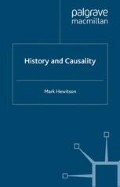Abstract
In Michael Oakeshott’s view, which he expounds in a review of E. H. Carr’s What is History? (1961), causal explanation threatens to elide the two separate meanings of ‘history’, namely a form of enquiry and a series of events in the past.1 In his criticism of Carr’s Marxist ‘Whiggism’ — or the distortion of the past for the purposes, or through the lens, of the present — Oakeshott mocked the historian of the Soviet Union for claiming that ‘history is the study of causes’, in which ‘every historical argument revolves around the question of the priority of causes’ and where determinism simply implies that there are no ‘causeless events’.2 The British philosopher’s targets, which, he implied, invalidated the very notion of ‘causality’, were the unjustified use of natural-scientific ‘laws’ in history and the ‘evolutionism’ of Marxist historiography, which manipulated events to arrive at a predetermined outcome: ‘There can in fact be no “scientific” attitude towards the past, for the world as it appears in scientific theory is a timeless world, a world, not of actual events, but of hypothetical situations’.3 Oakeshott’s priority was to preserve the particularity and alterity of the past, despite conceding that historians were obliged to ‘create and construct’ historical accounts, by examining the ‘relations’ — which were frequently identified only by their contiguity — between individual events.4 To use the term ‘cause’ simply to mean a set of events which bring about another event or set of events — rather than to connote adherence to a ‘law’ or historical direction — was to exclude ‘all that properly (or even distantly) belongs to the notion of causality’.5
Access this chapter
Tax calculation will be finalised at checkout
Purchases are for personal use only
Preview
Unable to display preview. Download preview PDF.
Notes
See also M. Mandelbaum, ‘Some Neglected Philosophic Problems Regarding History’, Journal of Philosophy, 49 (1952), 317
M. Oakeshott, ‘The Activity of Being an Historian’, cited in K. B. Mcfntyre, ‘“What’s Gone and What’s Past Help...”: Oakeshott and Strauss on Historical Explanation’, Journal of the Philosophy of History, 4 (2010), 91.
W. Dray, Laws and Explanation in History (Oxford, 1957); idem, Philosophy of History (Englewood Cliffs, NJ, 1964); M. Mandelbaum, ‘Determinism and Moral Responsibility’, Ethics, 70 (1960), 204–19
R. Adcock, ‘Who’s Afraid of Determinism? The Ambivalence of Macro-Historical Inquiry’, Journal of the Philosophy of History, 1 (2007), 346–64
M. Bunzl, ‘Causal Overdetermination’, Journal of Philosophy, 76 (1979), 134.
R. H. Ennis, ‘Mackie’s Singular Causality and Linked Overdetermination’, Proceedings of the Biennial Meeting of the Philosophy of Science Association, 1 (1982), 55–64
See P. A. Roth, ‘Varieties and Vagaries of Historical Explanation’, Journal of the Philosophy of History, 2 (2008), 214–26.
Ibid., 111. On the exaggeration of the differences of ‘verification’ in history and in natural sciences, see M. Mandelbaum, ‘Causal Analysis in History’, Journal of the History of Ideas, 3 (1942), 47.
P. A. Roth, ‘Nanative Explanations: The Case of History’, History and Theory, 27 (1988), 9
On the philosophical distinctions between actions, events and descriptions, together with a critique of such distinctions, see G. E. M. Anscombe, ‘Under a Description’, Nous, 13 (1979), 219–33.
See George Steinmetz, ‘Logics of History as a Framework for an Integrated Social Science’, Social Science History, 32 (2008), 536–53
William Sewell’s reply, ‘Response to Steinmetz, Riley and Pedersen’, Social Science History, 32 (2008), 579–93.
Sewell, Logics, 197–224; idem and A. Flügel, ‘Die Theorie des Ereignisses. Überlegungen zur “möglichen Theorie der Geschichte” von Marshall Sahlins’, Geschichte und Gesellschaft, 19 (2001), 46–74.
Ibid., 294–5. E. Morin, ‘Le retour de l’événement’, Communications, 18 (1972), 19.
Author information
Authors and Affiliations
Copyright information
© 2014 Mark Hewitson
About this chapter
Cite this chapter
Hewitson, M. (2014). Causes, Events and Evidence. In: History and Causality. Palgrave Macmillan, London. https://doi.org/10.1057/9781137372406_4
Download citation
DOI: https://doi.org/10.1057/9781137372406_4
Publisher Name: Palgrave Macmillan, London
Print ISBN: 978-1-349-47611-4
Online ISBN: 978-1-137-37240-6
eBook Packages: Palgrave History CollectionHistory (R0)

